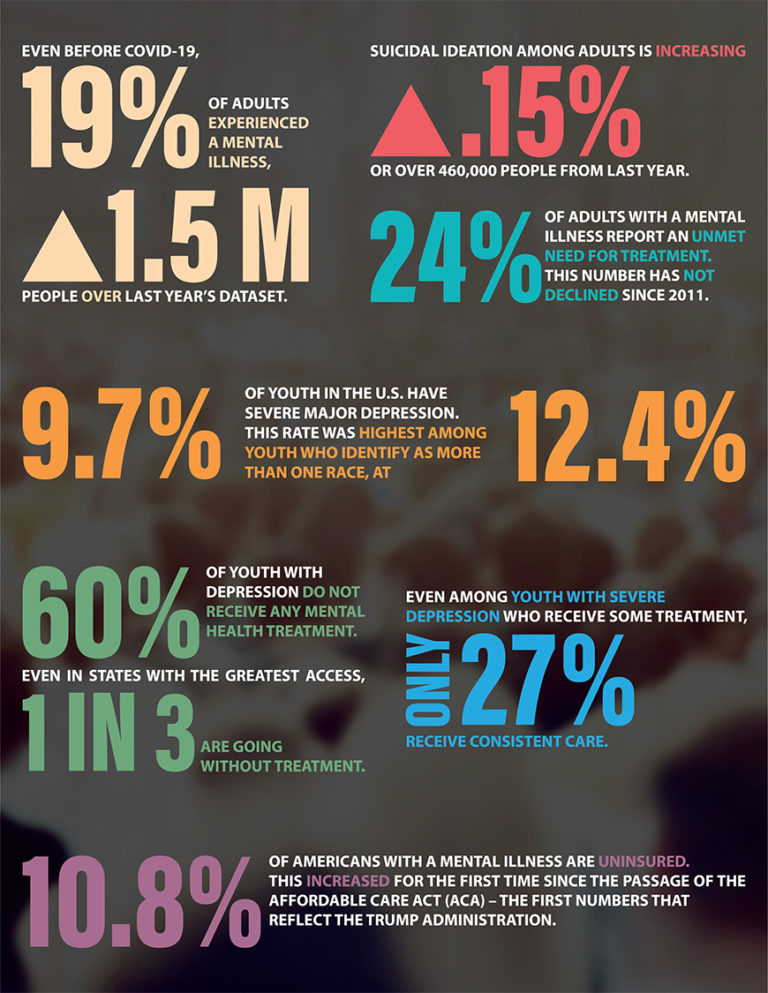Mental health is connected to your overall health and well-being. Many factors such as genetics, environment, events, brain chemistry, life experiences, and unhealthy habits can affect your mental health. Studies have shown that 46 percent of Americans will meet the criteria for a diagnosable mental health condition in their life with half of those people developing conditions by the age of 14 and three-quarters by age 24.
What is Mental Health?
Mental health includes emotional, psychological, and social well-being. It often affects the way we think, feel, and act. Additionally, it determines how we handle stress, relate to others, and make choices. It is an essential part of our overall well-being.
Why is Mental Health Important?
Mental health is critical to overall health. It is vitally important as it affects the way you:
- Cope with the stresses of life
- Stay physically healthy
- Have good relationships
- Make meaningful contributions to your community
- Work productively
- Realize your full potential
What are the Causes of Mental Health Conditions?
Mental health conditions may be caused by early adverse life experiences, other ongoing chronic medical conditions, biochemical imbalances, or a combination of these. Additionally, conditions may be related to excessive stress due to a particular situation or series of events – such as a pandemic, losing a loved one, or financial hardship.
COVID-19 has created uncertainty, grief, fear, stress, and worry for many. At the onset of the pandemic, routines were disrupted as the nation went into lockdown. Social interaction became obsolete as we were asked to socially distance from friends and family. Amid the pandemic, we had to learn to adjust to an everchanging environment – masking became the new norm, as did use of hand sanitizer and limiting capacities in public settings. As the pandemic continued through the remainder of 2020 and into 2021, many wondered if there was an end in sight.
Millions of people in the United States are affected by mental health conditions every year. Although the complete impact of COVID-19 on the mental health of the United States is still unknown, it’s important to note that even before the pandemic hit, mental health conditions were among the most common health conditions in the U.S. Therefore, it’s important as caregivers, parents, teachers, family members, friends, and doctors to identify possible warning signs and symptoms.
Warning Signs and Symptoms
Knowing the signs and symptoms of a potential mental health condition can be crucial in saving your life or the life of someone you know. The National Alliance on Mental Illness has indicated that the following signs may indicate the need for help from a healthcare professional.
- Excessive worries or fears
- Prolonged sadness
- Confused thinking or problems concentrating and learning
- Feelings of extreme highs and lows
- Strong feelings of irritability or anger
- Social withdrawal
- Difficulties understanding or relating to other people
- Dramatic changes in eating or sleeping habits
- Difficulty perceiving reality (delusions or hallucinations)
- Inability to perceive changes in one’s own feelings, behavior, or personality
- Substance use
- Frequent unexplained physical ailments
- Increasing inability to cope with daily problems or activities
- Suicidal thoughts
For immediate help in a crisis contact the National Suicide Prevention Lifeline at 1-800-273-8255 or the Crisis Text Line by texting HOME to 741741.
Mental health conditions can occur at any age. According to the Children’s Mental Health Network, 80 percent of mental health disorders begin in childhood with 50 percent beginning by age 14 and 75 percent beginning by the age of 24. Warning signs and symptoms can vary by age and younger children may not be able to explain their feelings or why they are behaving a certain way. Below are indications a child may need help from a healthcare professional.
- Decrease in school performance
- Poor grades despite strong efforts
- Persistent worry or anxiety
- Repeated refusal to attend school or take part in normal activities
- Hyperactivity or fidgeting
- Constant nightmares
- Continual disobedience or aggression
- Frequent temper tantrums
- Depression, sadness, or irritability
- Attempts or thoughts of suicide
Ways to Improve Mental Health
While all mental health issues can’t be prevented, there are many different things you can do to improve your mental health.
Stay Positive
It is important to try to have a positive outlook. It’s normal to feel negative emotions such as sadness and anger, but you don’t want those emotions to take over. Finding balance between positive and negative emotions can help create balance for your mental health.
Practice Gratitude
Practicing gratitude is the act of being thankful for the good things in your life. Practicing this daily, either by thinking about what you are grateful for or writing it down in a journal can really help center you and garner positive emotions. It’s important to allow yourself a moment to enjoy the positive experiences you’ve encountered – whether big or small.
Take Care of Your Physical Health
Taking care of your physical health can reduce stress and improve your mood. Ensure that you stay physically active – a daily walk, trip to the gym, or a workout video session could do the trick. Additionally, eat a well-balanced diet and make sure you get quality sleep every night.
Connect with Others
It’s important to have strong, healthy relationships with others as it builds a support system. From family and friends to those you meet in the community, those you connect with help bust stress and boost well-being. In fact, 71 percent of people turn to friends or family in times of stress, according to a survey by Mental Health America.
Develop Coping Skills
Coping skills are methods utilized to deal with stressful situations. Coping skills may help you face a problem, take action, or be flexible. Writing, physical activity, shifting your thinking, and getting support are all coping mechanisms that can help in dealing with stressful situations.
Meditation
Meditation is a mind and body practice where you learn to focus your awareness and attention. It usually involves a quiet location, comfortable posture, focus of attention, and an open attitude. Studies show that meditation offers help with anxiety and depression, as well as help with cancer, chronic pain, asthma, heart disease, and high blood pressure.
Relaxation Techniques
Relaxation techniques allow the body to naturally relax – slowing down your breathing, lowering your blood pressure, and reducing muscle tension and stress. Types of relaxation techniques include progressive relaxation, guided imagery, biofeedback, self-hypnosis, and deep breathing exercises.
It’s important to recognize when you or someone you know needs help. Contact your healthcare provider if you’re concerned with your mental health. Your healthcare provider can provide an accurate diagnosis or develop a treatment plan that could include medication, therapy, or other lifestyle changes.
If you have concerns with your own mental health, the healthcare providers at Roseman Medical Group are here to help. Schedule an appointment with one of our providers by calling 702-463-4040.
For immediate help in a crisis contact the National Suicide Prevention Lifeline at 1-800-273-8255 (en espanol: 1-888-628-9454) or the Crisis Text Line by texting HOME to 741741.
Article by Kristine Campo



